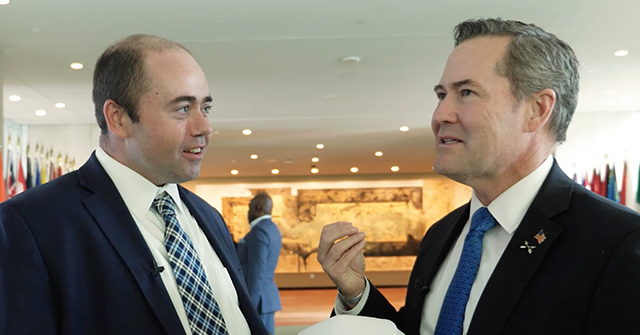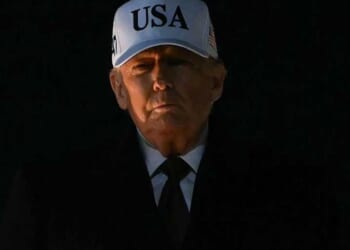NEW YORK — U.S. Ambassador to the United Nations Mike Waltz told Breitbart News exclusively that he, at the direction of President Donald Trump, is pushing to “Make the UN Great Again.”
Waltz, in a lengthy exclusive on-camera interview on the floor of the General Assembly of the UN taped on Oct. 23, took Breitbart News inside the nitty gritty of how Trump and his team are accomplishing this feat—using the strength of American taxpayer dollars to force reforms that have now been embraced at least to an extent by the Secretary General of the UN, Antonio Guterres. After the interview, Waltz took Breitbart News for a walk through the UN headquarters in Manhattan down the famous “Hall of Flags” where he handed Breitbart News a “MUNGA”—or “Make the UN Great Again”—hat. The hat, which is white and blue—UN colors—closely resembles the president’s red “MAGA,” or “Make America Great Again,” hats.
Waltz told Breitbart News that the UN has grown far too “bloated” with woke insanity since its founding—much like other bureaucracies such as USAID, which Trump and Secretary of State Marco Rubio gutted earlier this year.
“So just like we saw with USAID, this progressive ideology has infected so many aid organizations and then here at the UN—which has been around again since the end of World War II, set up in the wake of it in the 1940s—it’s now proliferated and bloated and grown like so many other bureaucracies would and do over 80 years,” Waltz said. “There are seven agencies that say their number one objective is dealing with climate. Seven. Regardless of how you feel about it, what you want to debate on it, let’s get that down to one at best and cut out the other six. What they call the Secretariat, which is kind of like the executive branch, has grown to tens of thousands of employees living here in one of the most expensive cities in the world. We’re going to cut that back.”
Waltz explained to Breitbart News how President Trump and his team are using the leverage of Americans’ tax dollars to force reforms to the UN—and that the Secretary General has agreed to cut his own budget by 15 percent. It’s the first time this century that the United States has implemented the use of such leverage, the last time being way back in the late 1990s when former Sen. Jesse Helms (R-NC) did it as chairman of the Senate Foreign Relations Committee.
“Look, we are withholding American funding,” Waltz said. “The President is withholding American funding until we see the reforms. We haven’t done that since Jesse Helms did it in 1999—it’s been 25 years. President Trump has done it, and in just the month that I’ve been here, we have a 15 percent cut to the overall UN budget. We have an 18 percent cut to their overall personnel. We have a 25 percent cut to their global peacekeeping force. The Secretary General has put forth a reform plan called the UN80—it’s the 80th anniversary of the UN—where he’s going to consolidate a bunch of these out-of-control agencies. He’s going to cut the overhead in the bureaucracy. We are going to give the UN tough love. I think we’re going to save it from itself in many ways, and we’re going to drive change, and the President knows best on how to, how to use that leverage, and my job is to actually push the UN to execute.”
While Waltz said these initial cuts from Guterres are not enough, they are actual cuts and a good start.
“Remember in Washington when the Democrats, for example, promote budget cuts—it’s just a decrease in the increase,” Waltz said. “It’s not an actual cut. I can already hear the voices, ‘Well, 15 percent, that’s not enough.’ It’s not—we agree. But those are actual cuts, and it’s the first time in the UN’s history that a Secretary General has actually proposed at our urging to make this place smaller. So I would just say it’s just the beginning.”
Waltz also told Breitbart News he and the Secretary General have a great working relationship. Waltz mentioned his time in the military—he was a Green Beret—and his time in Congress representing Saint Augustine, Florida, in the U.S. House, as proof he can accomplish these goals and work well with Guterres and the broader UN community to do so. He also explained that engaging with the UN and the related entities worldwide is important because if the United States just walked away and did not engage, then the rest of the world would be setting global standards on major economic and other policies.
“Well, look, I have no problem—I’m a soldier by background, and I fought for conservative causes as a congressman from North Florida,” Waltz said. “I have no problem sitting down and saying, ‘Let’s do as Reagan said — let’s do less better,’ right? Often getting bureaucrats and staff out of the way will actually help this organization be more effective. Like we’re seeing in Washington, we’ve actually got the mid level coming to us quietly saying, ‘Thank you, because of your tough love, so to speak, because of your strong push.’ Many of them have been trying to push these reforms internally for years and getting nowhere and now just in the last couple of months, they’re seeing results. So that’s one piece. The other piece I want to be sure to hit here is kind of the like, ‘Why do we even participate in this whole thing?’ There are many of these agencies that govern, regulate, provide standards for things around the world that deeply affect our economy and our businesses. These are in telecommunications, space, international shipping, spectrum allocation—all kinds of things that have to do with workers and workers’ rights. So when you hear about trying to bring manufacturing back home here, well, if you’ve got countries around the world that basically do slave labor, all the offshoring that’s happened over the years as we try to drive those supply chains back home, that really matters. So we have to make a choice. Do we just walk away and let China and Russia and all of these other countries set those global standards, or do we get in there and block and tackle in line for our companies and in line for an America First agenda? We just had a huge success story with the International Maritime Organization. Nobody’s ever heard of it. It’s based out of London and sets global standards for how our ports operate around the world, how shipping operates, what kind of fuel they use.”
Waltz then explained how the United States at the 11th hour and at the direction of President Trump intervened to stop the International Maritime Organization from levying a global carbon tax last month. That story, previously published on Breitbart News, includes Waltz detailing how the president’s entire team activated to stop it and pull what the globalist elites thought was a done deal out from under them.
Later in the interview, when asked what kinds of things these UN bodies and agencies set global standards for, Waltz said it has the potential to affect every aspect of Americans’ lives—and that is why he said the United States must engage to ensure that the United States’ competitors and adversaries do not rig the system against America.
“Ninety percent of global financial data that run our markets, that run the stock exchanges, our commodities trading, go through undersea cables—ninety percent,” Waltz said. “Not through satellites, not through radio or what have you—they go through these undersea fiber optic cables. Those fiber optic cables go through international waters. So who decides where they go, how big they are, when they’re laid, which companies, these international bodies come to a consensus. So if we’re not there, China, Russia, the Europeans, and others will be there setting these standards that will then affect us. Critical minerals is a key thing now that is driving our modern economy. Well, we have an initiative. It was an executive order the President signed on seabed mining. Again, in international waters, there’s these nodules of manganese and cobalt. Who governs that, who puts environmental regulations? So, really, it’s anything that leaves our airspace and leaves our international waters. Then it comes to these international bodies to decide the rules of the road with aviation. Key point there, I think—I don’t know about you but I want pilots, air traffic controllers, and what have you around the world speaking English and having the same standards of how you take off and you land, having air traffic controllers trained to a certain standard, having mechanics if you land in Paris or Abu Dhabi or somewhere trained to a certain standard that are fixing the planes. All of those are set. There’s an International Civil Aviation Organization in Montreal. Those are all set by these international bodies, and they all affect our—whether it’s our airlines or mining companies or shipping companies. So we have to be in there. We have to win.”
Waltz also noted that China has been somewhat helpful for the United States’ efforts to reform the UN, in large part because China is also spending much more on UN operations than it had in the past and is similarly outraged at the waste, fraud, and abuse. This unlikely alliance between the U.S. and China on UN reform comes amid heightened competition between the two nations on trade, rare earths, and standard-setting on things like artificial intelligence—but here, the two countries get along quite well.
“So interestingly, and this is where as part of what we do, we seek to find, I guess, kind of common ground,” Waltz said. “China is increasingly paying more and more into the UN system so that they can have more and more influence. But at the same time as more of their money is on the line, they’re looking at the bureaucracy here and actually working with us to cut back on it some. So there’s places where we can kind of work together, whether it’s with them or others, to make this place more efficient. Then we’ll lobby, and we’ll use what levers we have, to win these votes. But if you look at, for example, AI governance. We’re fighting for AI freedom. If you want to keep the federal government out of the way, we definitely want to keep a globalist government out of the way, but we’re seeing China influence these bodies so that it benefits their technology and their producers and not ours. That’s where we have to fight this fight.”
Waltz’s confirmation by the U.S. Senate came right before the U.N. General Assembly—or UNGA—earlier this fall in September, which threw him right into the thick of things on day one.
Waltz described UNGA as “kind of like the Super Bowl of global diplomacy,” and noted he was swimming in the deep end on day one.
“Literally almost every single world leader, their foreign ministers, their finance ministers, their whole delegations, come to these couple of city blocks all at once including the President, the Secretary, and half our cabinet, and I had the distinction of getting voted out of the Senate the day before,” Waltz said.
At the UNGA, Breitbart News interviewed both the Qatari Prime Minister and the President of the Republic of Congo—not to be confused with the neighboring Democratic Republic of Congo—and Breitbart News has also interviewed this year the President of Cyprus and the Prime Ministers of Israel and Greece. In addition to those heads of state interviews, other leaders like foreign ministers and other officials from other governments worldwide have also sat for major interviews with Breitbart News. Asked about these and more, and what he’s found with relations with other nations since he came into this job, Waltz told Breitbart News the rest of the world is by and large extremely thankful that Trump is back in the White House and taking proactive steps to engage in real reforms including those the president is pursuing here at the UN.
“It’s interesting to see what a lot of these governments may say publicly but then behind the scenes and closed doors there—especially when it comes to reforming this place—they look at me and go, ‘Thank you, and please tell President Trump, my president and my foreign minister thank him—and would love to be able to come to the Oval Office soon,’” Waltz said. “So you look at these conflicts that have just been frozen around the world whether it was DRC and Congo, Armenia and Azerbaijan—we could go down the list—Thailand and Cambodia, of course, the Middle East. In just eight months, he has suspended, stopped, or completely solved eight of them in eight months, right? His question to this body is, where have you been to help me more? And when? When we sat down with the Secretary General, the Secretary General was very gracious and said, ‘We want to help you more. We deeply appreciate you, President Trump, putting the credibility and the power of the presidency of the United States on the line to actually fix these problems.’ But interestingly, and this gets to another piece of what the UN does a lot is kind of aid, right? He said, ‘We want to use the UN’s presence around the world to lower barriers for American companies to come in,’ because he agrees with where the President is—I am in his cabinet—that when American companies invest not only does it create jobs back home but a rising tide lifts all boats. Rather than just throwing money and aid dollars at a problem, let’s actually improve the lives of the people there and when people, for example, in the Middle East through the Abraham Accords are talking about rail and ports and data centers they’re not talking about who has been shooting who for the last 2000 years. So watching the Secretary General and this body buy into the President’s business first, business binds people together, approach and an economics first approach has been really fascinating.”
When it comes to getting the Secretary General’s budget approved here this year, the UN has to approve it by consensus and the target window for doing so is small—by the end of the year. So Waltz and his team are currently working on building worldwide consensus for the Guterres budget, which includes the Trump-pushed-for cuts and reforms.
“So it’s kind of like—you know how the President proposes a budget and then Congress has to come into it? The Secretary can have a few votes,” Waltz said. “You can have a few votes. This is basically—it’s got to be unanimous. So first was getting the Secretary General to say, ‘We’ve got to have cuts,’ and to propose those cuts over to this body. The reality is between U.S. and China we pay about half of the budget and if President Trump and his team for the first time since the late 90s is saying, ‘We’re done throwing good dollars after bad; this is the American people’s money and until we see these reforms, we’re going to take that message.’ A lot of these—almost all of these—countries receive our money one way or another. The United States pays into the UN system more than 183 countries combined. So if they want to continue to see our support and our help with the backing of the American people they’ve got to clean up their act. That’s the message we’re going to send loud and clear. I think we’ll get them there.”
After this budget is done, which Waltz called “year one stuff,” then the goal shifts from there to more bureaucratic reforms to UN operations.
“We’ve got to get the budget but also we’ve got to cut back on the bloated bureaucracy,” Waltz said. “Those things we can get done in the next year and we already got done just in month one with a 25 percent cut to peacekeeping. Basically, these UN peacekeepers that are around the world, some of these peacekeeping missions, have been sitting around for 30, 40, 50 years. They’re obviously not doing what they intended to do. The Secretary General has agreed — we had a number of conversations — to a 25 percent cut around the world. That’s already starting to roll.”
The goal, he said, is to get it back to focusing on the core founding mission: to prevent another world war, and to foster peace worldwide.
“It was the UN founding interest,” Waltz said. “It’s just getting it, like so many agencies, bureaucracies—it’s just drifted in terms of what it’s doing. This is really pushing it, kicking and screaming, back to that original vision post-World War II. Let’s never have another world war, and let’s drive an agenda that creates a forum for countries to solve their conflicts peacefully and that’s what we’re going to push them to do.”
Waltz also said that other nations are pleased that the president and his team are seeking these changes at the UN and returning it to its original purpose.
“My first kind of bigger sit down was for example with the Caribbean countries right in our Western Hemisphere,” Waltz said. “We’ve got the gangs and the cartels and many of these trafficking organizations that have been running the show for far too long with no consequences and crashing people, weapons, drugs, onto our shores. It destabilizes all of these smaller island countries. We sat down and they said, ‘Thank you. How can we now work together through this body?’ First and foremost, we just created through the UN a gang suppression force in Haiti, we’ve given them an offensive mandate, and a key part of the America First agenda is that the United States shouldn’t have to do all of this alone. We need burden sharing. So the Kenyans are helping, El Salvador is helping, Guatemala is helping, and it’s—the United States has to lead and convene. So that’s an example of what we just did in the last couple of weeks that directly affects the migration crisis we’ve seen under the last four years, the drug crisis, the fentanyl crisis we’ve seen in the last four years. [And it’s] in line with the President’s agenda that we’ve ignored the western hemisphere for far too long, and we’re going to get it back under control.”
Asked, to round out the interview, if, looking back at Trump’s second term, UN reform could be a landmark achievement like NATO reform was in Trump’s first term, Waltz said he thinks it could be.
“You just had the NATO Secretary General repeatedly say only President Trump could get both Zelensky and Putin on the phone,” Waltz said. “Only President Trump could get them from not talking at all to at least talking. We’ve gone from here to here. We’re not quite there yet, and the rest of the world has to help out. That means you have these burden-sharing mechanisms, whether it’s NATO, whether it’s ASEAN and APEC—the President’s trip out to Asia—or whether it’s right here to the UN if anybody can clean this place up, and I’d be proud to be a small part of it. It’s President Trump, and I think you’re absolutely right. That’s going to be a key element of his second term.”


















